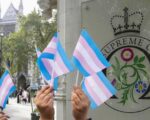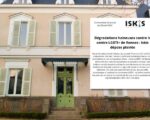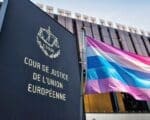>> Ukrainian MPs have voted down a gay rights law in a decision likely to kill chances of EU visa-free travel by the end of the year.
[spacer]
Les députés ukrainiens ont voté jeudi contre un amendement du code du travail visant à interdire les discriminations à l’encontre des minorités sexuelles, une mesure dont la mise en œuvre est pourtant exigée par l’Union européenne en préalable à une libéralisation du régime des visas souhaitée par Kiev. Seuls 117 sur les 450 députés se sont prononcés en première lecture en faveur, alors qu’un minimum de 226 voix était requis.
« Un statut spécial envers les minorités sexuelles est aujourd’hui inacceptable. Ils ne sont pas victimes de discrimination », a justifié Pavlo Oungourian, député du « Front populaire » du Premier ministre Arseni Iatseniouk.
L’obtention d’une libéralisation du régime des visas dans la zone Schengen est une promesse phare des autorités pro-occidentales, arrivées au pouvoir après la chute du régime du président pro-russe Viktor Ianoukovitch, destitué après trois mois de contestation proeuropéenne sur le Maïdan à Kiev, réprimée dans le sang.
Au préalable, Kiev doit compléter un programme de mesures qui vont de la délivrance de passeports biométriques, à la bonne surveillance des frontières et une politique migratoire et d’asile performante pour éviter que le pays ne devienne une porte d’entrée incontrôlable dans l’UE. De nombreuses autres conditions, comme l’état de droit, le respect de la liberté de mouvement, la lutte contre la corruption, le crime organisé et les discriminations, sont également exigées par Bruxelles.
« C’est un véritable coup porté à nos chances d’obtenir une libéralisation du régime des visas », a réagi Irina Guerachtchenko, députée à l’origine de la proposition d’amendement, sur sa page Facebook. Selon Irina Souchko, de l’ONG ukrainienne « L’Europe sans barrières », ce vote représente « une grande perte en terme d’image pour l’Ukraine ».
« Nous savons qu’il y a des discriminations contre la communauté LGBT dans le cadre du travail et pas seulement…», a renchéri Tetiana Mazour, directrice d’Amnesty International pour l’Ukraine, interrogée par l’AFP.
« Le fait que cet amendement anti-discrimination n’ait pas été adopté témoigne de l’incapacité à surmonter les stéréotypes erronés de l’époque soviétique », a-t-elle ajouté. L’homosexualité, qui était punie par la loi en URSS, reste très stigmatisée en Ukraine, une ex-république soviétique où l’Église orthodoxe a une forte influence.
[spacer]
>> Just 117 out of the 450 members of the Verkhovna Rada, on Thursday (5 November), voted Yes to amending the country’s labour code to ban workplace discrimination on grounds of sexual preference.
The Rada is to hold a second vote on an as-yet unspecified date.
But opposition will be hard to overcome.
Thursday’s decision came despite a TV speech, on Wednesday, by Ukrainian president Petro Poroshenko in which he said a Yes vote would let “Ukrainian citizens visit EU countries without visas as early as next year.”
Several MPs from his own parliamentary bloc abstained from the vote.
Some members of prime minister Arseniy Yatsenyuk’s pro-EU party also attacked the bill.
« As a country with a thousand-year old Christian history, we simply cannot allow this … today, a special status for sexual minorities is simply unacceptable,” Yatsenyuk MP Pavlo Unguryan said, according to the AFP news agency.
The Rada vote attracted criticism from Ilga-Europe, a Brussels-based NGO.
Evelyne Paradis, its director, told EUobserver on Friday: “The rejection of these urgently needed anti-discrimination provisions is disappointing and concerning in equal measure.”
She noted that, last year, Poroshenko promised to protect “equality between citizens, regardless of their sexual orientation”.
“This principle appears to have been forgotten now.”
For his part, European Commission chief Jean-Claude Juncker, in August, promised to recommend Ukraine visa-free travel to member states by the end of the year.
“Given the progress in Ukraine, I don’t doubt for a second the member states will approve [it],” he said.
The Commission and Ukraine started visa talks in 2008. But the EU made the deal conditional on anti-corruption and human rights reforms.
Juncker underlined the conditionality in a letter to Poroshenko, seen by the Reuters news agency, also on Thursday.
“Progress in reforms in the area of the fight against corruption remains a key priority for achieving visa-free travel to the EU,” he said.
The anti-corruption efforts have also stalled.
EU diplomats and leading NGOs, such as Transparency International, are saying that Ukraine’s prosecution service, for instance, operates like an organised crime syndicate.
Meanwhile, Thursday’s vote shows that Ukrainian society is closer to Russia in terms of social mores than to western Europe.
Both countries decriminalised homosexuality shortly after the fall of the Soviet Union.
But a small gay pride march in Kiev in June saw right-wingers attack demonstrators and injure policemen.
Backwards
Meanwhile, Russia is going backwards: A new law, tabled last week by the Communist Party, proposes fines or 15-day detentions for “the public expression of non-traditional sexual relations, manifested in a public demonstration of personal perverted sexual preferences in public places.”
The New York-based NGO, Human Rights Watch, has denounced the bill.
Russia, in 2013, already banned what it calls “gay propaganda”, as well as adoption of Russian children by foreign same-sex couples.
In a sign of the geopolitical import of the issue, Russian propaganda has tried to spook Ukrainians into thinking EU integration will force them to become gay-friendly.
According to one Ukrainian diplomat, Russian groups in 2013, in the run-up to Kiev’s decision on whether to sign an EU association pact, sent leaflets to Ukrainian schools saying parents will be forced to give up children for adoption by gay couples in Europe if the treaty goes ahead.

















